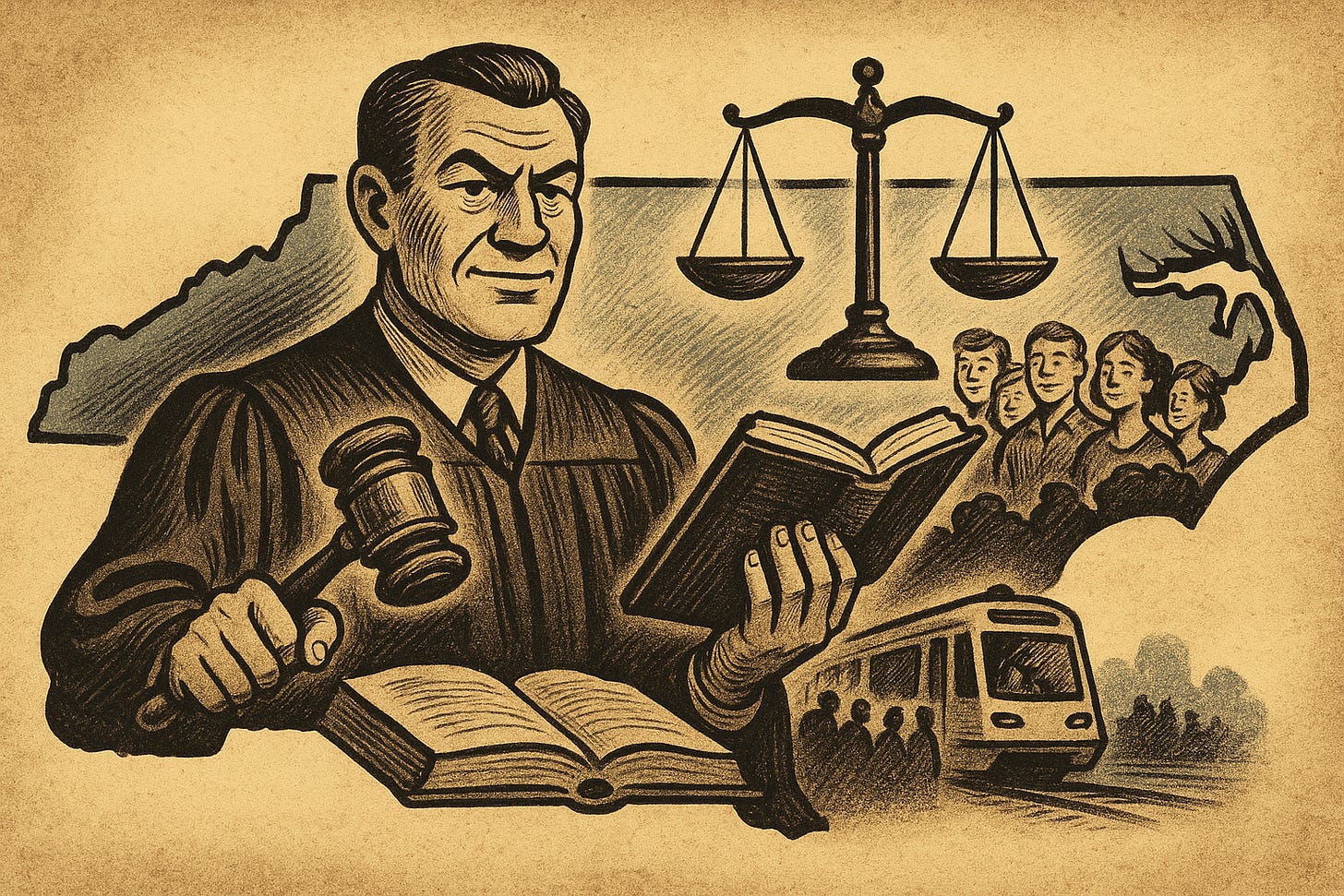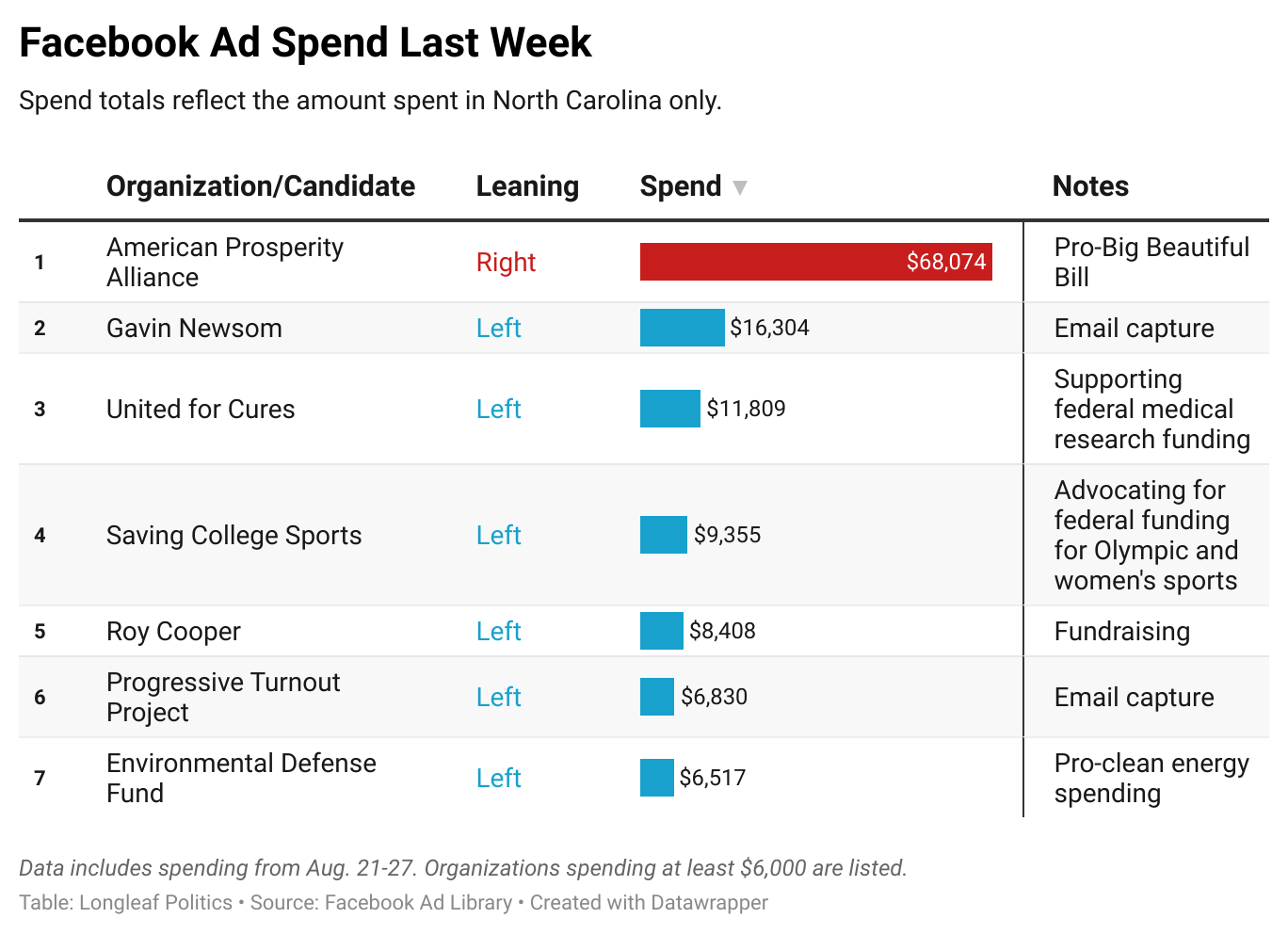Why Republican judges tend to win
Unaffiliated voters like judges who stick to the rule of law. Will that open the door to district court judges in big cities?
I got the chance to join the Hornet’s Nest Republican Men’s Club for Judicialpalooza last week. Which is a fantastic name for an event, by the way.
It was a powerhouse crowd, with multiple Court of Appeals judges on hand, plus several candidates who want to join them next year.
The U.S. Senate race is going to suck up all the oxygen, but the stakes in the 2026 judicial elections are pretty high, too. Democrats will make a hard run to re-elect Justice Anita Earls, and if they do, they could flip the N.C. Supreme Court by winning two of three seats in 2028.
Fallout from the Jefferson Griffin challenge notwithstanding, my read is that Rep. Sarah Stevens still has better-than-even odds to beat Earls, even at a steep money disadvantage.
There’s a simple reason why.
Court of Appeals Judge Michael Stading put his finger on it at the event. Stading described how he talks to unaffiliated voters, and even some Democrats, when he’s campaigning. He simply asks: What do you want out of a judge?
“If they’re honest, they’ll say, ‘I want a judge who will follow the law,’” Stading said.
It shouldn’t be this way, but that simple statement is very Republican-coded in this era. The conservative view of the judiciary — interpret the law, don’t write it — is broadly popular. Out of all the justices on the North Carolina Supreme Court, it also fits Earls the least.
You can see it in the results: Since judicial races became partisan again in 2018, Republicans have won 19 of 26 statewide contests, sweeping all three in 2020 and all six in 2022 to build a 5–2 Supreme Court majority. The Riggs/Griffin race broke a 12-straight streak, but the overall pattern still holds.
Job first. Voters don’t want crusaders in robes. They want adults who apply the rules as written.
Safety always. Real accountability for people who prey on others.
Fair means predictable. Same rules, same consequences — whether you’re powerful or not.
But don’t just focus on the top of the ticket
That message travels from Raleigh to the courthouse down the street.
Yes, appellate seats are critical — but metro-area Superior and District Court races are just as important. In Mecklenburg County, Republicans didn’t even field district court candidates in 2024.
Still, Judge Matt Osman won an eight-year Superior Court term in 2022, and Paulina Havelka came within about 1,000 votes. There’s a lane when the pitch is simple and credible: law first, politics second.
Charlotte was reminded of those stakes in the worst way. In my column this week, I wrote about Iryna Zarutska, a 23-year-old who fled Ukraine and was killed on our light rail.
Public safety has to involve serious judges in local office. That’s the case for Republican judges right now: keep their oath, protect the innocent, and treat every life as non-negotiable.
Read the column here (no paywall with this gift link): Killing on the light rail should jolt Charlotte awake
At a premium
Important reads
Congressman Don Davis, a N.C. Democrat, embraces Andrew Yang's centrist Forward Party (WUNC)
Tech companies failing to protect children from deep-fakes, 'sensual' AI chat bots, NC says (WRAL)
Why Red States Can't Govern (American Mind)
Top spenders on social media last week
Question of the week
Last week, I asked you about the Cracker Barrel logo. A plurality (41%) of you said you don’t care, and 36% said it’s bland and soulless. That sounds about right.
This week, let’s talk about judges.




Good morning, Andrew,
The election of judges should be a non-partisan thing but this doesn’t reflect the reality of what is happening in today’s political environment.
Yes, the NC senate race is going to suck up all the money, publicity, energy, and everything else. I agree that all the other races need our attention, especially the judges. I wish we had a better way to better evaluate how we elect them.
Enjoy your Labor Day holiday
At the federal level, the three branches are supposed to be the “checks and balances” to one another. At the state and district level, this doesn’t apply nearly as much, does it? If a judge is supposed follow the rule of law, but is also supposed to be the check on the legislative branch, there is then somewhat of a conflict in purpose to some degree, is there not?